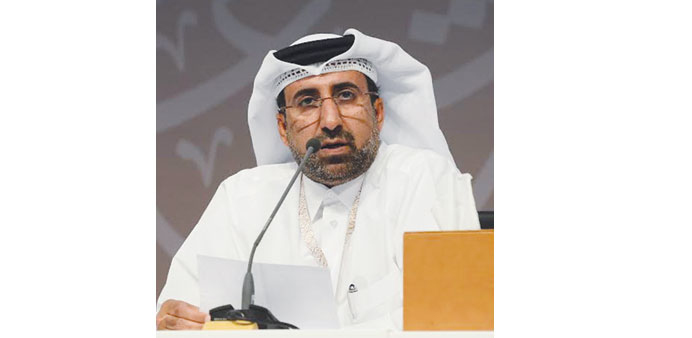The Qatari constitution has given high importance to social, legal and security aspects, which are also upheld by the Qatar National Vision (QNV) 2030, a senior official told ongoing the 13th UN Congress on Crime Prevention and Criminal Justice yesterday.
“QNV 2030 aims at establishing a community based on justice, charity and equality,” stated Brigadier Abdullah Saqr al-Muhannadi, director of the Human Rights Department, while presenting a paper about the experience of Qatar in accomplishing criminal justice for prisoners and juvenile delinquents.
The paper was prepared in association with the Penal and Reformatory Establishments Department and Security Strategic Studies Centre (SSSC) at the Ministry of Interior. SSSC director Major Mohamed Rabeea al-Kaabi chaired the session.
“QNV 2030 is a comprehensive vision for the future with broad prospects of economic, social and cultural progress and environmental protection and human development for the present and subsequent generations and it is consistent with the Constitution in the provisions of the link between the security and social issues on justice and the rule of law approaches, “ Brigadier al-Muhannadi explained.
The official pointed out that the importance and vitality of the criminal justice system and crime prevention could not be understood without associating it with human, social and economic development issues and establishing the state of institutions and law and wise governance.
“The strategy of Qatar’s Ministry of Interior was formed in accordance with the Constitution and QNV 2030, linking between the issues of security and justice on one side and social issues on the other.
“The first pillar of the strategy is “public security” and particularly the article related to crime prevention and combating, stipulates that the reasons of crimes should be understood for early detection of wrong behaviours and its outcomes. The second pillar “relationship with community” emphasises the importance of building relationship of mutual respect with the society.
“The ministry has prepared its systems and departments such as Penal and Correctional Institution, Juvenile Police and Human Rights Department governed by strategic and scientific planning and a wide range of activities to reform the offenders and protect the juveniles,” he maintained.
Brigadier al-Muhannadi reiterated that the Human Rights Department at the Ministry of Interior has contributed in the preparation of the executive regulation of a special law that deals with prisoners to ensure the requirements of the human rights for the inmates and his family as well as the right of those who deal with them.
“All these match with international standards, which were drafted in 1955, in line with the social values and principles of Islam,” the official added.
Major General Dr Abdullah Yousuf al-Maal, advisor to the Minister of Interior and chairman of the Preparatory Committee of the Congress; Major General Abdul Azeez al-Ansari, director of International Co-operation Department; Brigadier Mohamed Saud al-Othaibi, director of Penal and Reformatory Establishments Department; Brigadier Abdullah Saad al-Buainain, director of Nationality and Travel Documents Department; Colonel Abdul Rahman al-Sulaiti, director of Strategic Planning Department; Colonel Abdullah Khalifa al-Muftah, director of Public Relations Department and a number of officers from the Ministry of Interior attended the session.

Brigadier Abdullah Saqr al-Muhannadi addressing the Congress yesterday.
